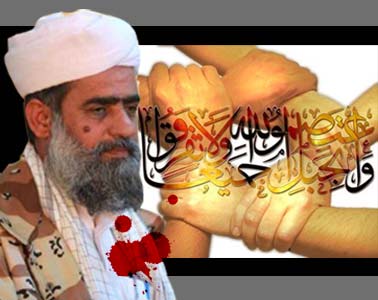| Returning from Friday prayers on January 20, 2012, Maulavi Mostafa Jangi Zehi, the Friday prayers leader of Iran’s southeastern town of Rask, was brutally assassinated on the Chabahar-Sarbaz road in Sistan-Baluchestan province. |

Mostafa Jangi Zehi was born in 1955. He began his Islamic religious studies with his father. In 1963, he went to Pakistan to continue his studies at Talim-Ul-Furqan, Haji Delmorad, and Motahhar-ul-Ulum schools in Pakistan. Having returned to Iran, Molavi Jangi Zehi benefitted from the teaching sessions of such great scholars as Maulana Taj Mohammad Bozorgzadeh, Maulana Mohammad Othman Faqirzadeh, and Maulana Abd-ul Aziz Molazehi at the Azizieh Dar-ul Uloom (Islamic seminary) in Sarbaz, a city located nearly 500 km South of Zahedan. Jangi Zehi was elevated to the Maulavi status, an honorific Islamic religious title meaning highly-qualified Islamic scholar given to Sunni Muslim religious scholars preceding their names, in 1975.
Maulavi Jangi Zehi had, long before his death, expressed his belief that revealing the crimes of the Riyadh and Manama regimes is the religious duty of the Sunni scholars in Iran.
The Iranian cleric, who was a prominent advocate of Shia-Sunni unity, had been repeatedly threatened via several statements by Jundallah terrorists to be killed. In addition, Abdel Raouf Rigi, ringleader and spokesman for terrorist Jundallah group, had already authorized his murder by describing it as “holy jihad against the infidels.”
Returning from Friday prayers on January 20, 2012, Maulavi Mostafa Jangi Zehi, the Friday prayers leader of Iran’s southeastern town of Rask, was brutally assassinated on the Chabahar-Sarbaz road in Sistan-Baluchestan province.
No group has claimed responsibility for the murder of the cleric. The reports said that Suleiman Koh’sari, an individual who was the cleric’s companion, was also martyred in the attack.
The Jundallah terrorist group has carried out numerous bombings, assassination attempts, and terrorist attacks against Iranian government officials and civilians, including women and children, in Sistan-Baluchestan province. The arrested members of the group have all admitted they killed people in order to create sectarian strife in the region.

The arrested members of the group have all admitted they killed people in order to create sectarian strife in the region.
Jundallah's notorious leader, Abdolmalek Rigi, was arrested by Iranian intelligence forces in February 2010 and executed in June 2010 after being found guilty of 79 criminal charges, including manslaughter, armed robbery, bombing operations, and armed attacks on Iranian police and civilians.
Rigi stated in his confessions that he had dealings with the US government and was promised unlimited funds and resources for “waging an insurgency” in Iran.
Recently leaked US intelligence documents show that the Israeli intelligence agency Mossad recruited Jundallah terrorists to carry out attacks on Iranian targets.
